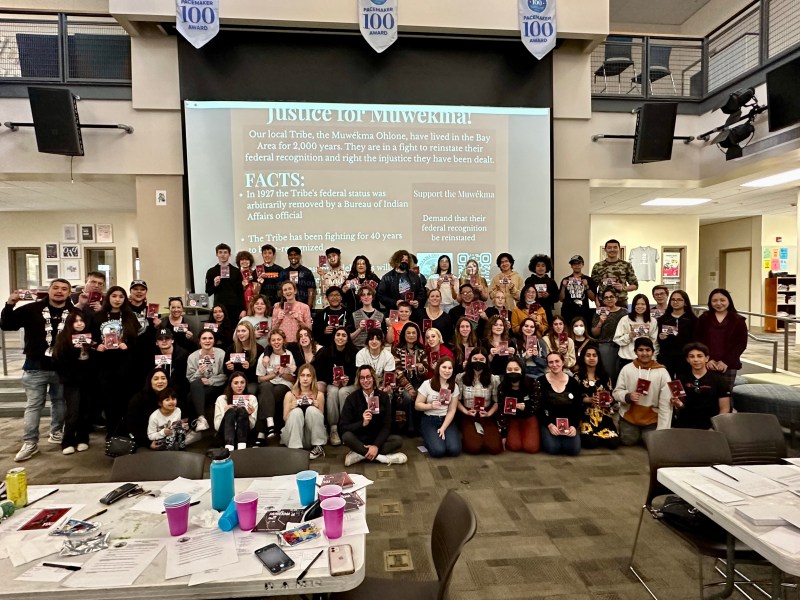Federal recognition for the Muwekma Ohlone Tribe, whose ancestral land in the Bay Area includes Stanford’s campus, has been a struggle for indigenous activists for 40 years. In a recent grassroots effort, this past weekend, Justice for Muwekma, a movement that supports the tribe’s fight for federal recognition, hosted three letter-writing events to Congress throughout the Bay Area.
According to Charlene Nijmeh, the chairwoman of the Tribe, numerous grassroots efforts are underway, including in Palo Alto, to put an end to the activists’ struggle and secure federal recognition for the Muwekma Ohlone Tribe, once and for all.
The Department of Justice describes the legal term “recognition” as a status wherein the United States “recognizes a government-to-government relationship with a Tribe” and that the Tribe can self-govern as a “domestic dependent nation,” providing tribal sovereignty.
Since the winter of 2022, the grassroots movement for Muwekma Ohlone federal recognition has been accelerated with letter-writing events to Congress throughout the Bay Area, according to the chairwoman. “This movement started because the government, specifically in the Bay Area, ignores us,” Nijmeh said. “But they cannot ignore the vote of the people — their constituents who voted them in.”
This past weekend, Justice for Muwekma hosted three letter-writing events: one at Palo Alto High School, another in San Jose and a third at the Chabot College in the East Bay.
With federal recognition, the chairwoman said, the Muwekma Ohlone Tribe — a group with over 600 tribal members — can finally repatriate artifacts. Alameda County alone has 250,000 Ohlone artifacts, according to the chairwoman. “We cannot put [our ancestors’] spirits to rest without having our federal recognition confirmed,” she added.
Nijmeh said the Justice for Muwekma movement took off because of local Bay Area students, including students at Stanford. She added that it is often young people who show support for the Tribe’s federal recognition efforts.
“Part of the reason that there’s been so much momentum with the movement is because the chairwoman has been so visible,” said Jonathan Lockwood, the spokesperson for Muwekma Ohlone. “Charlene is speaking at TEDx Berkeley, Palo Alto High School, doing countless interviews with national media and then she’s also out in D.C. advocating for the tribe. This is history-making.”
The chairwoman said that she is seeking a corrective measure through Congress for federal recognition with the introduction of a bill. There are three avenues for federal recognition: an act of Congress, the rule of a U.S court or execution of the guidelines set by Part 83 of Title 25 of the Code of Regulations (CFR).
As reported previously by The Daily, only 18 petitions have been acknowledged using the pathway of Part 83 of Title 25 from a pool of 356 letters of intent from groups calling for federal recognition.
The Muwekma Ohlone Tribe started organizing for federal recognition in the early 1980s and sent a petition to the U.S. government in 1995, according to the Muwekma Ohlone Tribe website. On May 24, 1996, the Bureau of Indian Affairs (BIA) provided a positive determination, which provided confirmation that the Tribe existed between 1914 and 1927. The Tribe asked the BIA to reinstate their earlier federal recognition, but the BIA responded that the Muwekma Ohlone Tribe needed to go through the federal recognition process and submit additional documentation, according to the chairwoman.
“During the [federal recognition] process, we had a negative determination based on what [the BIA] said was that the community ceased to exist from 1927 to 1985, which is not the case,” Nijmeh said.
“All we are asking for is to have our existence acknowledged that we are still here,” Nijmeh told the students of Palo Alto High School at a talk last Friday. “Our people have survived far worse for far longer. We can outlast this generation of politicians, even if it means the struggle continues.”
Malcolm Harris, a journalist who grew up in Palo Alto, said that he joined the chairwoman in Washington D.C. to lobby for Congress to provide federal recognition. Harris published “Palo Alto: A History of California, Capitalism, and the World” in February. His book begins and ends with a discussion of the Muwekma Ohlone, which is how he was connected to the chairwoman.
“I grew up on Muwekma land,” Harris said. “The conclusion of this book has been not only of these people who exist who have been wronged and are owed but also looking toward the future of this region and of the world by repairing the damage that has been done by these political systems.”
“What’s important for us is to have our future generations stay on our 10,000-year-old land,” the chairwoman said. “Time is of the essence. Our people are being gentrified out of the area because of the cost of living. Certain people are trying to wait us out so that we can be pushed out. But we’re still here, and we’re not going away.”
